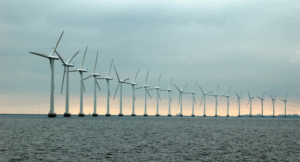
![]() The European Commission has concluded that a UK scheme called “Contracts for Difference” that promotes the generation of electricity from renewable sources is in line with EU state aid rules. In separate investigations, the Commission has also found that public support worth £9.7 billion to five offshore wind farms is in line with the state aid rules. The Commission found, in particular that all projects further common EU objectives, such as the promotion of renewable energy and environmental protection, without unduly distorting competition in the Single Market.
The European Commission has concluded that a UK scheme called “Contracts for Difference” that promotes the generation of electricity from renewable sources is in line with EU state aid rules. In separate investigations, the Commission has also found that public support worth £9.7 billion to five offshore wind farms is in line with the state aid rules. The Commission found, in particular that all projects further common EU objectives, such as the promotion of renewable energy and environmental protection, without unduly distorting competition in the Single Market.
Commission Vice-President in charge of competition policy Joaquín Almunia said: “The UK Contracts for Difference encourage all renewable energy technologies producing electricity to compete against each other for support beyond 2016. It is a fine example of how to promote the decarbonisation of the economy with market-based support mechanisms, at the lowest possible cost for consumers“.
In June 2014 the UK notified plans to support renewable electricity production through market-based mechanisms. The scheme will run for 10 years starting in April 2015, with a budget of £15 billion. Selected individual projects will be able to receive support for up to 15 years.
‘Established’ technologies (such as onshore wind, solar photovoltaic, energy from waste with combined heat and power, small hydropower, landfill gas and sewage gas) will compete against each other for support in a common auction.
‘Less established’, new and innovative technologies (such as offshore wind, wave, tidal stream, anaerobic digestion or geothermal energy) will initially benefit from allocated budgets in order to promote their further development but will also be subject to competitive auctions with some degree of cross-technology competition.
Biomass conversion plants will be supported through dedicated tenders up to 2017. After that, the UK will evaluate whether biomass can be included in the common tenders for established technologies.
Aid granted under the scheme will be paid out as a variable premium on top of a reference electricity (wholesale) price, and up to a pre-defined strike price, based on a so-called “Contract for Difference” (CfD). Generators will earn money from selling their electricity into the market as usual. When the average wholesale price of electricity is below the strike price, generators will receive a top-up payment. In case of high wholesale electricity prices, revenues for the generator will be capped at the strike price to ensure that there is no overcompensation. In addition, as of 2016 no support will be paid in case of periods of negative prices longer than six hours.
The payments will be financed through a tax imposed on energy suppliers. To ensure that the tax does not discriminate overseas generators, imported renewable electricity will not be subject to the tax. In the long run overseas generators will be allowed to compete for CfDs on the same terms as national generators.
The Commission assessed the scheme under its new rules on state aid for environmental protection and energy. The scheme is in line with the objective to promote renewable energy while avoiding overcompensation and without unduly distorting the internal energy market, given in particular the competitive and non-discriminatory procedures to allocate the aid.
Green light to support five off-shore wind farms
The Commission has also approved today aid for five large off-shore wind projects. Their size ranges from 258 MW to 1 200 MW (totalling around 3.14 GW). The Walney, Dudgeon, Hornsea, Burbo Bank and Beatrice wind farms together will provide 3.3% of the UK electricity generation capacity, which should help the UK to meet its 2020 renewable target and to reduce greenhouse gas emissions.
Support will be based on Contracts for Difference under the CfD scheme approved today. The selection of the projects was done in an open, transparent, competitive and non-discriminatory auction. The process is designed to avoid support in excess of what is really necessary for the investments to be carried out. The projects are therefore in line with the guidelines on state aid for environmental protection and energy.



